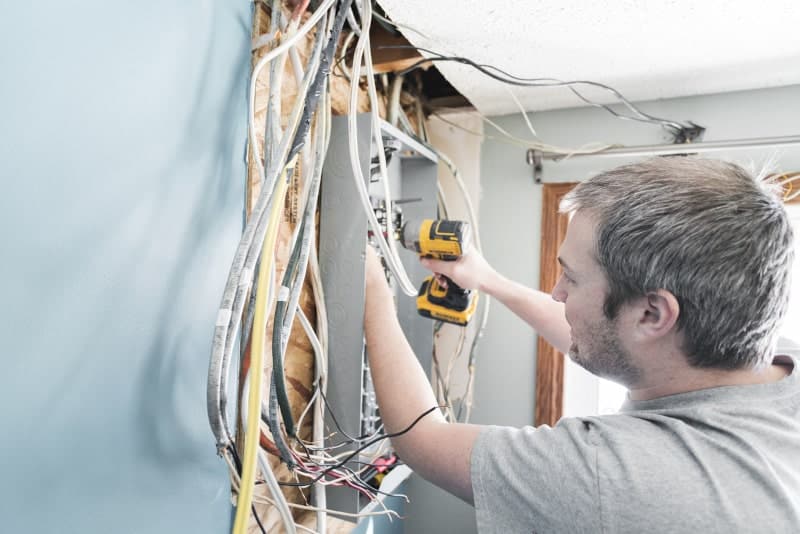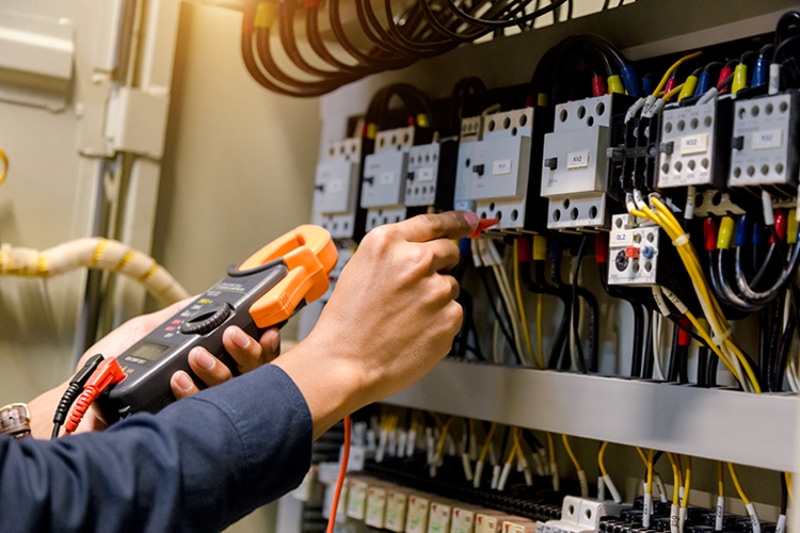July 19, 2025
Are you experiencing frequent electrical surges, flickering lights, or a burning smell from your outlets? It might be time to consider house rewiring. This crucial process ensures the safety of your home, improves energy efficiency, and ensures compliance with regulations. But how do you know if your house needs rewiring, and what does the process entail? From initial inspection and assessment to the removal of old wiring, understanding the house rewiring process is essential for homeowners. Choosing the right electrical contractor is also paramount, as their experience and positive customer reviews can make all the difference. And once the rewiring is complete, the benefits are numerous, including enhanced safety, increased property value, and long-term cost savings. However, it's important to avoid common mistakes during the process and to stay on top of aftercare and maintenance to ensure the longevity of your rewired house. Plus, consider the impact of house rewiring on property resale, as it can attract potential buyers and enhance home appraisal in the real estate market. So, if you're ready to learn more about the process and benefits of house rewiring, keep reading!

Credits: skillstg.co.uk
House rewiring is more than just a routine maintenance task - it's an essential step in ensuring the safety of your home and family. Over time, old wiring can become frayed, damaged, or outdated, posing a serious fire hazard. By investing in house rewiring, you can eliminate these risks and create a safer living environment for everyone in your household.
Not only does house rewiring enhance safety, but it also brings significant improvements in energy efficiency. Outdated wiring systems often result in energy wastage and higher utility bills. With modern electrical components and properly installed wiring, you can reduce energy consumption and save money on your monthly expenses. It's a win-win situation for both your wallet and the environment!
In addition to safety and efficiency benefits, house rewiring is crucial for compliance with regulations. Building codes are constantly updated to reflect new safety standards and technological advancements. By keeping your home's electrical system up to code through rewiring, you avoid potential fines or complications when selling or renovating your property down the line.
Do you often experience sudden electrical surges in your home? It might be a sign that your house is in need of rewiring. These surges can not only be inconvenient but also dangerous, posing a risk of electrical fires and damage to your appliances. If you're tired of constantly dealing with power fluctuations, it's time to consider rewiring your house for a more reliable electrical system.
Are your lights frequently dimming or flickering for no apparent reason? This could indicate an issue with the wiring in your home. Dimming or flickering lights are not just annoying, they could be a symptom of underlying problems that require immediate attention. By investing in house rewiring, you can eliminate these frustrating lighting issues and ensure a stable and consistent flow of electricity throughout your home.
Have you ever noticed a strange burning smell coming from any outlets in your house? This is definitely cause for concern and should not be ignored. A burning odour could signal overheating wires or faulty connections, both of which are serious fire hazards. To safeguard against potential electrical fires, it's crucial to have your house inspected for possible rewiring needs as soon as possible.
The first step in the exciting process of house rewiring is the initial inspection and assessment. This involves a professional electrician thoroughly examining the existing wiring system to identify any safety hazards, outdated components, or potential issues. The assessment provides a clear understanding of what needs to be done and ensures that the rewiring project will meet all safety standards and regulations.
Once the inspection is complete, it's time for planning and permits. This part may not sound thrilling at first, but it's essential for ensuring that everything is done legally and safely. Proper planning involves determining the scope of work, creating a detailed plan for new wiring installation, and obtaining necessary permits from local authorities. It sets the stage for a smooth and successful rewiring process.
After all the necessary preparations are made, it's finally time for one of the most satisfying steps - Removing old wiring! Outdated or faulty electrical wiring can pose serious safety risks, so getting rid of them feels like saying goodbye to potential hazards lurking in your walls. Removing old wiring also creates space for modern and efficient electrical systems to be installed, bringing your home up to date with advanced technology.

When it comes to house rewiring, choosing the right electrical contractor is crucial. You'll want to make sure they are fully licensed and insured, so you can have peace of mind knowing that the work will be done safely and up to code. A reputable contractor will have no problem providing proof of their credentials, so don't hesitate to ask for this information.
Experience with house rewiring is another key factor to consider when selecting an electrical contractor. Look for a company that has a proven track record in handling residential house rewiring projects. Their expertise and familiarity with the process will ensure that your home's electrical system is in capable hands.
Reading customer reviews can also give you valuable insight into the quality of service provided by an electrical contractor. Positive feedback from previous clients indicates reliability, professionalism, and exceptional workmanship. Take the time to research and find a contractor who consistently delivers outstanding results.
When it comes to house rewiring, the cost can vary depending on several factors such as the size of the house, the complexity of the electrical system, and the materials used. However, it's important to note that investing in a professional and thorough rewiring job can save you money in the long run by preventing potential safety hazards and ensuring efficient energy usage.
The average duration of a house rewiring process typically ranges from one to three weeks, again depending on various factors like the size of the property and any additional installations or upgrades required. It's crucial to work with an experienced electrician who can provide a realistic timeline based on your specific needs. Additionally, budgeting tips such as getting multiple quotes and considering financing options can help make this investment more manageable.
Don't let cost and time estimates deter you from addressing necessary house rewiring. The benefits far outweigh any temporary inconvenience or financial commitment. With proper planning and professional assistance, you'll have peace of mind knowing that your home is safe, up-to-date with electrical codes, and equipped for modern energy demands.
Professional house rewiring can significantly enhance the safety of residents by eliminating outdated or faulty electrical wiring that may pose fire hazards. With new and updated wiring, homeowners can have peace of mind knowing that their family and property are protected from potential electrical accidents.
Another exciting benefit of professional house rewiring is the increased property value it brings. Upgraded electrical systems are a major selling point for homebuyers as they offer modern convenience and safety features. This means that investing in rewiring can potentially raise the market value of your home, making it a wise financial decision in the long run.
Moreover, professional house rewiring leads to long-term cost savings. By installing energy-efficient wiring and fixtures, homeowners can reduce their electricity bills and minimise maintenance expenses associated with older electrical systems. The initial investment in rewiring pays off over time through lower utility costs and fewer repairs, providing both financial and practical benefits.
Ignoring warning signs during the house rewiring process can lead to serious electrical issues down the line. It's crucial to pay attention to any flickering lights, outlets that are not working properly, or strange burning smells. These could be indicators of underlying electrical problems that need immediate attention from a professional electrician.
Attempting DIY electrical work during house rewiring is extremely risky and can result in dangerous consequences. Without proper knowledge and experience, homeowners should never attempt to rewire their own houses. Electrical work requires precision and expertise to ensure safety and compliance with building codes. It's always best to leave it to licensed professionals who have the necessary skills and training.
Hiring unqualified contractors for house rewiring can lead to shoddy workmanship and potential hazards in your home. It's essential to thoroughly research and vet any electricians before hiring them for the job. Look for reputable companies with positive reviews, proper licensing, insurance, and a proven track record of successful residential house rewiring projects.

Credits: skillstg.co.uk
Ensuring the aftercare and maintenance of rewired houses is essential to guarantee the longevity and functionality of the electrical system. Regular inspections by a qualified electrician can help identify any potential issues or areas that require attention, preventing costly repairs in the future. These inspections provide peace of mind for homeowners, knowing that their electrical system is safe and up to code.
In addition to regular inspections, handling electrical issues promptly is crucial for maintaining a rewired house. Whether it's addressing flickering lights, tripping breakers, or faulty outlets, having an experienced electrician on hand can resolve these issues efficiently and effectively. This proactive approach not only ensures the safety of occupants but also prevents minor problems from escalating into major electrical malfunctions.
Furthermore, upgrading electrical systems as technology advances can enhance energy efficiency and overall performance in a rewired house. From installing smart home devices to optimising lighting controls, staying abreast of technological advancements allows homeowners to maximise the benefits of their newly rewired electrical system. By investing in upgrades when necessary, homeowners can enjoy a modernised living space with improved convenience and cost savings.
House rewiring can significantly impact the resale value of a property, making it more attractive to potential buyers. Upgraded electrical systems provide peace of mind to homeowners and give them confidence in the safety and reliability of the home's wiring. This added assurance can be a major selling point for individuals looking to purchase a new home, giving your property an edge in a competitive real estate market.
In addition to attracting potential buyers, house rewiring can also enhance the appraisal value of your home. Appraisers take into account the condition and functionality of a property's electrical system when determining its overall worth. By investing in house rewiring, you are not only ensuring the safety and efficiency of your home but also increasing its market value. This improvement could result in a higher appraisal amount, ultimately leading to greater returns when selling your property.
It's important for homeowners to stay informed about real estate market trends, especially when considering selling their property. With an increased focus on energy efficiency and smart technology integration, having updated electrical wiring can make your home more appealing to modern buyers who prioritise these features. By staying ahead of current market demands through house rewiring, you position yourself as offering a valuable asset that aligns with contemporary preferences.
At EA Electrics, we understand the importance of reliable and professional electrical services for local residents and businesses in South West Sydney. Our team of trusted electricians is dedicated to providing top-notch electrical solutions, including installations, repairs, and maintenance. Whether you need assistance with lighting, power points, switchboards, or any other electrical issue, we have the expertise to get the job done efficiently and effectively. With our commitment to quality and customer satisfaction, you can trust EA Electrics to deliver the reliable electrical services you need. Contact us today for all your electrical needs.
House rewiring is the process of replacing or upgrading the electrical wiring in a house to ensure safety, efficiency, and compliance with electrical codes.
House rewiring is necessary to prevent electrical hazards, such as electrical fires, electrocution, and damage to electrical appliances. It also ensures that the electrical system can handle the electrical load of modern appliances and technology.
Signs that your house may need rewiring include frequent electrical issues like tripped circuit breakers, flickering lights, burning smells, outdated wiring materials, and the absence of grounding. It's best to consult a professional electrician for a thorough inspection.
The process of house rewiring involves assessing the existing electrical system, creating a rewiring plan, obtaining necessary permits, removing old wiring, installing new wiring, updating outlets and switches, and conducting thorough testing to ensure safety and functionality.
The benefits of house rewiring include improved safety, reduced risk of electrical fires, enhanced electrical performance, increased energy efficiency, compliance with electrical codes, and the ability to accommodate modern electrical needs.
TL;DR: House rewiring is important for safety, energy efficiency, and compliance with regulations. Signs that your house needs rewiring include frequent electrical surges, dimming or flickering lights, and a burning smell from outlets. The process involves an initial inspection, planning, removal of old wiring, and choosing the right electrical contractor. Professional house rewiring can enhance safety, increase property value, and result in long-term cost savings. Avoid DIY work and unqualified contractors, and prioritise regular inspections and handling electrical issues. Upgrading electrical systems can attract potential buyers and enhance home appraisal in the real estate market.